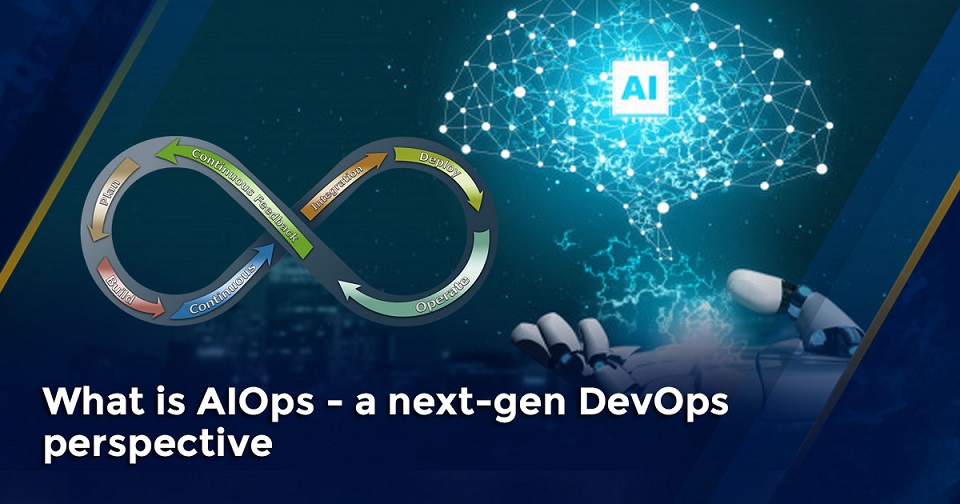Digital transformation of enterprises has led to the creation of an IT infrastructure comprising gigantic data warehouses and hybrid and multi-cloud systems. The development has led to the generation of humongous sets of data from various channels, customer touchpoints, and device platforms. The unparalleled pace of data generation makes it difficult for organizations to manage IT, which is critical to streamline operations, enhance monitoring, and pursue business continuity.
Given the limitations of the existing IT solutions to manage data, enterprises are leveraging AIOps to undertake a host of activities. These include understanding and predicting customer behavior, detecting anomalies and determining their reasons, and offering prescriptive advice. It helps to detect dependencies responsible for creating issues in an IT infrastructure. Also, with AI having features such as containerization, continuous monitoring, predictive or adaptive cloud management, enterprises can gain a next-gen perspective on their business.

What is AIOps?
It is a software system comprising big data, machine learning, and artificial intelligence to enhance the capability and functioning of all primary IT functions. The IT functions may include automation, IT service management, performance monitoring, and event correlation and analysis, among others. In other words, AIOps is applying data science and machine learning to the DevOps framework to make it more efficient and productive.
The benefits of integrating AI into the value chain are:
■ Speedily and accurately processing all types of data generated from various sources. This results in ensuring data integrity and achieving tangible results.
■ Analyzing humongous sets of data to generate actionable insights for DevOps engineers to understand and make infrastructure adjustments (if needed).
■ Identifying event patterns and set automated triggers in response.
AIOps vs DevOps: The Difference
DevOps is arguably the best software development methodology that increases the speed of deployment of quality software solutions in any organization. So, why AIOps has become a crucial requirement for enterprises? Let us find out.
■ The main difference between AIOps and DevOps is the multi-layered formation of the former that can automate IT operations and enable algorithmic analysis on its own. On the other hand, DevOps transformation involves leveraging agile development methodologies and using them to automate self-service operations.
■ AIOps executes tasks in real-time without any human intervention. It can analyze and organize IT tasks as per the data sources, which traditional DevOps cannot understand let alone execute them.
■ AIOps can perform a host of data-driven analytics activities such as streaming data management, historical data management, and log data ingestion, among others. It can allow stakeholders from various business units to view insights by leveraging visualization capabilities.
■ Even though DevOps quality assurance can automate the deployment of the build using containers and automation tools, it lacks in areas such as security and compliance, and system operations.
■ DevOps QA helps to streamline the SDLC through CI/CD pipelines whereas AIOps offers a scalable platform to automate and manage IT operations involving humongous sets of data.
■ The importance of AIOps will increase in the days to come as next-gen enterprise applications running on multiple cloud ecosystems will require to be monitored and managed in real-time.
Why Should Businesses Adopt AIOps?
Building and implementing next-gen enterprise applications would entail the use of Artificial Intelligence and Machine Learning driven AIOps methodology.
The benefits of leveraging this next-gen methodology are:
■ Eliminates IT noise: IT noise can expose teams to false-positives, bury root-cause events, and make it difficult to detect outages. It can also lead to performance issues, higher operating risks and costs, and disavowal of enterprise digital initiatives. AIOps driven tools can reduce or even eliminate noise by building correlated incidents pointing at the root cause.
■ Superior customer experience: With customer experience becoming the most crucial factor in driving profitability, AIOps can make predictive analysis and automate decisions related to future events. By analyzing data, AIOps can predict events impacting the availability and performance of IT systems. Besides, by identifying the root cause of IT issues, it can help solve them instantly.
■ Better collaboration: AIOps can break functional silos and streamline workflow for IT groups and other business units. It can generate customized dashboards and reports for teams to grasp their tasks quickly and act upon them.
■ Enhance service delivery: AI, ML, and automation can help the service delivery team of any enterprise in query resolution by analyzing usage patterns, support tickets, and user interaction. By applying probable cause analytics, it can forecast underlying performance issues and help to solve them.
Conclusion
Although DevOps test automation is the de facto standard for enabling automation of IT processes, AIOps can be a different ballgame altogether. It can rightfully take the mantle from DevOps as its next-gen avatar by minimizing the dependence of enterprises on specific automation tools. Further, AIOps can monitor the behavior of IT infrastructure and by aligning data resources it can optimize work processes and drive profitability.
